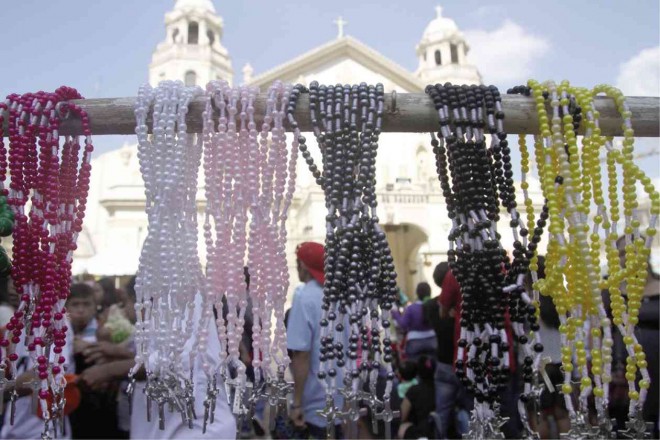Over 200 rescue personnel to assist Nazareno devotees

Aside from devotees, vendors looking to make a killing are expected to troop to Quiapo Church in Manila for the Feast Day of the Black Nazarene on Jan. 9. JOAN BONDOC
More than 200 rescuers and medical personnel will be on hand to handle emergencies during the Feast of the Black Nazarene on Jan. 9, according to the Metropolitan Manila Development Authority (MMDA).
The emergency responders who are collectively known as the Metro Manila Council Rescue Legion was formed after Supertyphoon “Yolanda” wreaked havoc in parts of the Visayan region, MMDA General Manager Corazon Jimenez said on Sunday.
They helped the agency when it conducted rescue and rehabilitation operations in the affected areas, she added.
“Now they will also be part of all our activities here in Metro Manila. For the grand procession on Thursday, they will be in charge of the emergency and rescue operations,” Jimenez said.
On top of the 200-plus rescue team, the MMDA will also deploy 2,000 personnel, mostly traffic constables and street sweepers, for the Jan. 9 annual procession, which is expected to draw millions of people.
Article continues after this advertisement“With the 12 million devotees expected to join the annual celebration, the MMDA will need all the help it can get to maintain a peaceful and orderly procession,” Jimenez said in the agency’s weekly radio program.
Article continues after this advertisementMeanwhile, an official of the Department of Public Works and Highways (DPWH) has warned about the state of an old bridge in Manila, saying its load must be regulated for Thursday’s event.
Public Works Undersecretary Romeo Momo said on Saturday that people joining the “traslacion”—the transfer of the Black Nazarene image from Quirino Grandstand in Rizal Park to Quiapo Church—would be allowed to use only one side of MacArthur Bridge while the other side may still be used by light vehicles.
The bridge crosses Pasig River and connects the P. Burgos area to Carriedo.
Momo said a recent technical inspection conducted by the DPWH’s Bureau of Design found minor cracks on MacArthur Bridge, adding that it was scheduled to undergo retrofitting to reinforce the foundation.
“It can be used for the procession but people should be moving; the flow of the procession should be continuous,” he stressed.
Momo noted that last year, they assigned 50 to 100 personnel to augment police and the local government units assisting devotees during the procession.
“There should be crowd control so that people would move continuously,” he said, adding that they initially suggested that Jones Bridge, instead of MacArthur Bridge, be included in the procession route, but the feast organizers apparently did not agree.
As part of preparations for the Jan. 9 event, organizers of the Feast of the Black Nazarene said they would use a system to help monitor and immediately respond to any untoward situation.
According to the Minor Basilica of the Black Nazarene (Quiapo Church) website, the group tasked to man the command center located inside the church would be using the Protective Services, Safety, Health, Environment and Disaster (PSSHED) system.
The system was created for mapping, recording and sending information from the area of the incident to the command center.
The PSSHED system will enable the command center, which will be manned by the staff of Quiapo Church’s disaster risk reduction ministry and information technology department, to easily monitor the situation during the procession.
This will also allow them to easily communicate with the agencies responsible for peace and order that are positioned in strategic areas along the route of the procession, allowing these to immediately respond to any situation.
The feast traditionally celebrated on Jan. 9 draws millions of devotees who walk barefoot with the image of the Black Christ in a procession as a sign of penance and thanksgiving for favors received.
Last year, at least nine million devotees participated in the procession, traversing a 3-kilometer route from the Rizal Park to the Quiapo Church, which took nine hours.
The annual observance will start with the procession of the replicas of the Black Nazarene at Quiapo Church on Jan. 7 at 3 p.m.
The traditional “pahalik” will take place at the Quirino Grandstand in Rizal Park on Jan. 8 at 1 p.m. while the vigil will start at 7 p.m.
On Jan. 9, Manila Archbishop Luis Antonio Cardinal Tagle will celebrate Mass at Rizal Park at 6 a.m. to be followed by the procession of the image of the Black Nazarene to Quiapo Church at 7:30 a.m.
MMDA Metro Parkway Clearing Group head Francis Martinez, meanwhile, asked devotees and vendors to have their own trash bags during the procession.
“Let us help street sweepers by properly disposing of our trash,” Martinez said during the weekly radio program.
He noted that 242 tons, or 31 trucks, of garbage were collected in Metro Manila after the New Year revelry. Plastic bottles, Styrofoam food containers and barbecue sticks made up most of the collected trash, said Martinez.
Originally posted: 8:36 pm | Sunday, January 5th, 2014
Related stories
Black Nazarene devotees warned on 2 old bridges
Black Nazarene slowly advancing toward MacArthur Bridge